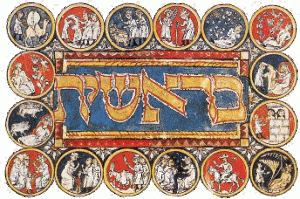In the last post, Tishrei—Past, Present, and Future, we discussed how all Tishrei holidays – Rosh HaShanah, Yom Kippur, Sukkot, and Simchat Torah – are connected by the same thread of time and, more specifically, the unification of past, present, and future. This cluster of Tishrei holidays is culminated and concluded with Shabbat Bereshit, when we start the new annual cycle of reading the Torah. Not surprisingly, Shabbat Bereshit follows the same pattern of unification of past, present, and future.
The Torah starts with the creation of the world. The story of Creation, obviously, relates to the past.
The word “bereshit,” means, in the beginning. The root of “bereshit” is “reshit” – beginning. Beginning, however, points into the future – to something that will follow the beginning in the future.

Thus far, we easily identified the themes of past and future in the first chapter of the Torah. But where is the present?
The Lubavitcher Rebbe, Rabbi Menachem Mendel Schneerson, in his speech on Shabbat Bereshit, explained that on that day we should focus on the notion that Bereshit – the beginning – is not something that happened thousands of years ago, but something that happens every moment.
The Psalmist wrote,
“Forever, O Lord, Thy word standeth fast in heaven.” (Psalms 119:89)
As it is explained at length in Tanya, the founder of the Chassidic movement, the Baal Shem Tov, interpreted this verse to mean that the word of G‑d that created the universe in the first place forever stands in heaven continuing to recreate the universe at every moment. Every moment is a new creation. And this is the missing piece of the puzzle – the present moment.
There is a saying, wherever I go, I have to drag myself along, and that spoils all the fun. Indeed, wherever we go, we bring along our baggage, and not all of it is positive. Although we just began a new year, we come to it with our old habits, prejudices, misconceptions, and limitations. Every year, on Rosh HaShanah, we are given a new beginning, a new chance but, if we remain our old selves, what good is it? Every year, the slate is wiped clean for us on Yom Kippur, but what if we continue to make the same mistakes pursuing our old habits? Every New Year, people make resolutions to start exercising, to lose weight… It doesn’t take even a few weeks for most of us to slide back to our old habits, to our old selves.
Alan Lightman, in his wonderful book, “Einstein’s Dreams,” writes that time is sticky like glue, and one can get stuck in it:
“But in this world, the texture of time happens to be sticky… individual people become stuck in some point of their lives and do not get free.”
People who dwell too much on the past, get glued to it, and, as time moves on, get swept with it into the past.
As the Lubavitcher Rebbe suggested, the solution to this problem is to meditate on the profound concept of continuous recreation of the world. If every moment is a new creation, we are being recreated anew. There is no need to drag our old self with all the baggage along. Let old habits, old limitations, all weaknesses remain in the past and allow yourself to be created anew. We may have a choice of what we want to bring along into each new moment. Let us bring to each new moment the blessing of Rosh HaShanah, the forgiveness of Yom Kippur, the joy of Sukkot and Simchat Torah. If we could only internalize this concept, we could be free from all negativity of the past. This is a powerful message of the present moment, the lesson of Shabbat Bereshit.
